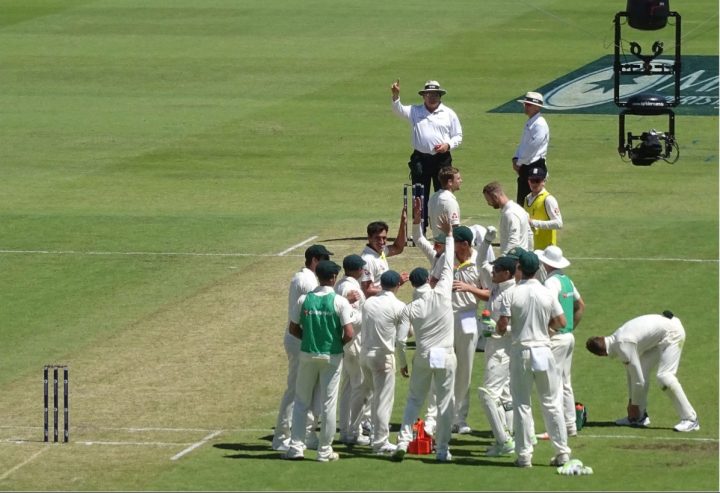
It’s not often we feel sorry for international cricketers. With the exception of professional cricket commentators, and maybe Playboy photographers (if you’re a bloke), they’ve got the best job in the world. However, it seems a little unfair that the England team have to begin an unnecessarily long one-day series so soon after the Ashes finale.
The first game – a warm up match against a Prime Minister’s XI in Canberra – starts on Sunday night. That’s barely three days after the raucous celebrations at the SCG. Half the team have probably still got alcohol poisoning.
It also seems a little harsh that Alastair Cook is already back in England. You’d have thought he’d be allowed to hang out with the squad a little while. No sooner had Cook won the Compton-Miller Medal than his beer was snatched out of his hand and he was bundled onto the first plane back to Blighty. ‘Thanks for winning us the Ashes, Ali, now buggar off. Send our regards to Stuart Broad’.
In a way though, Cook is one of the lucky ones. Over the next few weeks his one-day contemporaries somehow have to motivate themselves to play a warm up match, two T20 internationals, and then 7 one-day internationals. Let me spell that out for you like the BBC football videoprinter when extraordinary results come in. That’s 7 (SEVEN) fifty over matches. Blimey.
Although England’s form in one-day internationals has been encouraging of late, I wouldn’t be surprised if we struggle in the forthcoming matches. The Aussies will want revenge. We (probably) want to go home. Furthermore, we’ll be missing two key members of our attack. Broad is recovering from injury, whilst Jimmy Anderson has gone home for a well earned rest.
The obvious question, of course, is this. Why doesn’t the limited overs fare take place before the test series? That way it serves as a delicious appetiser as both sides weigh each other up and try to strike psychological blows before the main event. It was thus before the 2005 Ashes and during the glory years of the Texaco Trophy.
The counter argument is that both sides need these warm up games to prepare for the forthcoming World Cup, but we’re not buying that. The conditions in the subcontinent will be very different to Australia – especially if the Aussies insist on leaving grass on the wicket to stifle Graeme Swann.
There is one upside, however: those of us who have an insatiable appetite for cricket, and feel rather empty now the Ashes have finished, have something extra to look forward to. If, like me, you fall into this bracket, you probably ought to get out more. I’ve been trying, but my leg muscles wasted away during the Ashes and I can’t get off the sofa.
James Morgan









MHA: I’m a stick in the mud Luddite when it comes to ODIs. I never saw what was wrong with the old Texaco Trophy format – three ODIs before the tests as an appetiser. Admittedly, Australia have staged a long ODI series after the Ashes for many years now (we won it last time, and in 1986/7 for the clean sweep). But you take my point…
I like the old format, too. Having the ODIs after the Tests means that the winning side just wants to go home and celebrate, the losing side just wants to go home and lick its wounds. Neither side wants to play, and even if Australia thrashes England in straight sets, it won’t change anyone’s memory of the Ashes.
” However, it seems a little unfair that the England team have (HAS) to begin an unnecessarily long one-day series so soon after the Ashes finale.”
GRRRRRRR
Oh come on, Mr Edant! In UK English, single nouns referring to groups are almost always treated as plurals in grammar terms.
Manchester United have won the league.
The Conservative Party have published their election manifesto.
Asda have announced their half year profits.
And so on. It’s Australians who have the quirky (Australia has won) approach.
No they’re not. Only if you write for the Guardian. You’re just repeating the error. ‘Team’ is singular. No matter how many people are in that team, there is only one team.
The exception is when the usage is ambiguous, or doesn’t make sense in the singular.
Can you quote me some examples from the mainstream press of the England team being referred to in the singular?
Since when has working for the British press indicated a sound use of English?
What yardstick would you like to use, then? Languages are defined by usage. In the context of referring to the England cricket team, the most authoritative and definitive usage, surely, is that of the mainstream press, which is where most England supporters will get their coverage from.
How can an amorphous collective – the mainstream press – which has such a variety of styles and usage rules, be ‘authoritative and definitive’?
Because most English people who read about cricket will do so in the mainstream press. If not, then where? Which other yardstick would you suggest?
I was asking how a collective, which contains contradictory views on style, can be ‘definitive’?
http://www.telegraph.co.uk/finance/newsbysector/retailandconsumer/6527054/Wal-Mart-sells-Asda-for-6.9bn-in-group-restructuring.html
“..Asda sold ITS subsidiary…”
http://www.telegraph.co.uk/finance/newsbysector/retailandconsumer/8015927/Asda-revamps-unloved-food-range.html
“Asda completely overhauling ITS medium-priced food line…”
http://www.guardian.co.uk/commentisfree/2010/apr/30/the-liberal-moment-has-come
“Though the Conservative party HAS good policies on equality, IT HASN’T….”
http://www.abs-cbnnews.com/sports/07/22/10/manchester-united-most-valuable-sports-team-report
“Manchester United IS most valuable sports team…”
‘Manchester United IS the most …’ I don’t think that’s an appropriate example. In the example you give, the sentence is referring to a singular club, not a collective team.
Sky sports also uses England in the plural sense. When the Aussies displayed ‘England wins the Ashes 3-1’ on the big screen at the SCG, Sky’s graphics bar said ‘England win the Ashes 3-1’. I would rather trust an English broadcaster’s use of the English language than an Australian one.
In my personal opinion, I believe both are acceptable. The SCG was referring to England as a singular country, Sky was referring to a collection of people i.e. Strauss, KP etc.
Another example. ‘When democracy is introduced into a country, the people WIN’. It would be wrong to say that ‘the people WINS’. England (a collective) WIN the Ashes. It’s wrong to say that England Wins the Ashes. However, it’s really not a big deal. As I said, both uses are probably acceptable.
Welcome to The Full Toss … a voice of the English grammar follower. Anybody got any thoughts on the cricket?
Pretty obvious why both teams agreed to 7 ODIs. There is an ODI World Cup being played next month.
Do you really think the desires of the fans come into this?
7 ODIs in conditions that are totally different to the subcontinent isn’t necessarily the best preparation for the World Cup from any perspective. I think five would have been best. But as you say KP, what do us fans know?! I reckon the money men are drawing up the fixture list.
I think cash is a more likely motivation. They milk it for all it’s worth these days.